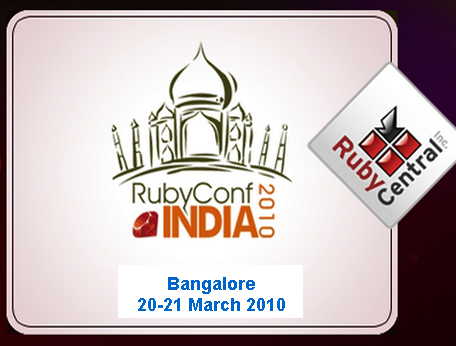
Ruby enthusiasts will come together in Bangalore for the ThoughtWorks RubyConf India 2010 ThoughtWorks is set to organize India’s first ever conference on Ruby. Aimed at bringing together enthusiasts, users and followers of Ruby, the event, is a recognition of the fact that Ruby has gained enough momentum to be the next big revolution in Open Source programming.
(RUBY is a dynamic, open source programming language with a focus on simplicity and productivity. It has an elegant syntax that is natural to read and easy to write. Since its public release in 1995, Ruby has drawn devoted coders worldwide. In 2006, Ruby achieved mass acceptance. With active user groups formed in the world’s major cities and Ruby-related conferences filled to capacity)
Speaking about the idea behind the decision to organize RubyConf in India, Roy Singham, Chairman,ThoughtWorks ( the principal sponsors) said, “We’ve been doing conferences in India for the last 10 years. Five years ago if we had organized a RubyConf India, there’s not a chance that we would have had 200 people subscribe to this. It would have been mainly people from ThoughtWorks and a few others. Now, there is an increased awareness in cool emerging technologies and it’s a really positive step for India.”
So where does Ruby feature in the life cycle of Open Source? “If you look at the big picture, between the late 80’s and 90’s, the software industry had gone through a 10 year cycle where there was no radical innovation in languages. Nothing happened in the commercial space other than C# and Java. I believe this was a major disaster for the software and IT industry and it was driven by economic reasons and not by technical reasons. The creation of software has been commoditized”, Singham feels.
The developer world’s response was in the form of Ruby Central in the Unites States, which became the world’s home for language innovation. The Ruby community today is an embracing, open, intellectual community. The other partner who helped accelerate the change was Sun. Sun’s JRuby reduced the barrier to entry for new language. JRuby allowed the perception that you could actually introduce a Ruby on Rails application without disrupting the existing infrastructure. That reduced the chasm and allowed Ruby to become a major player. Apple too has started reducing the amount of Apple script and using more Ruby.
Having gained foothold in the developer world, Ruby seems to be ready to for the next round of collaborative software creation. Singham adds , “We’re seeing massive adoption simply because it’s so ridiculously easy for me to track what other guys have contributed. In fact, if you look at the trend, the Ruby guys are probably the most vocal, the most interactive group followed by Java. And you can correlate this. Today if you look at corporate support for Ruby, pretty much every major player is supporting it. Apple has a community supporting MacRuby which is a native implementation of Ruby on the Mac. Sun and now Oracle are basically building JRuby on the JVM. Microsoft has IronRuby which is at 0.92, it’s practically ready to ship.
RubyConf will happen in Bangalore at the Royal Orchid, on March 20 and 21. http://rubyconfindia.org/